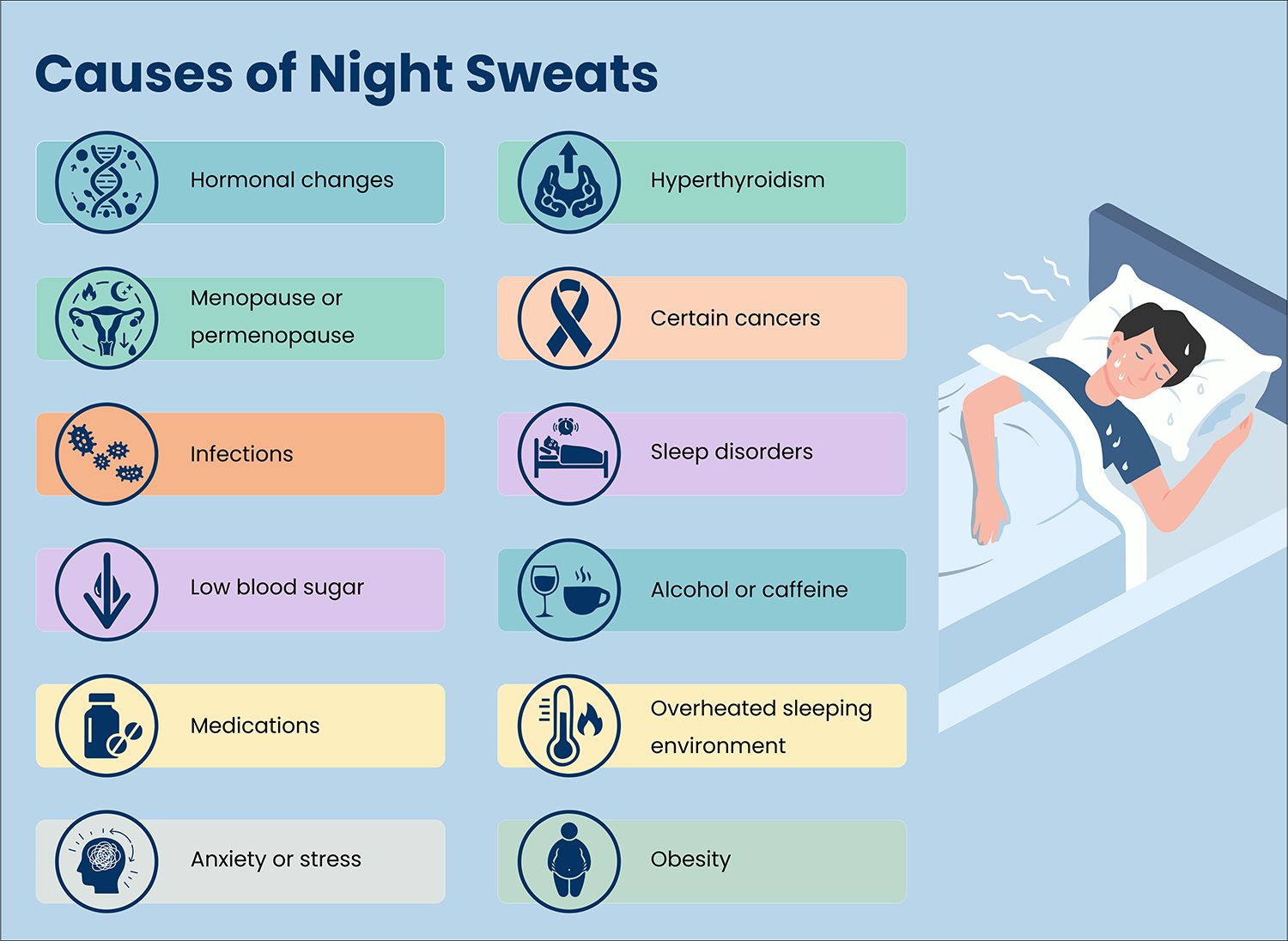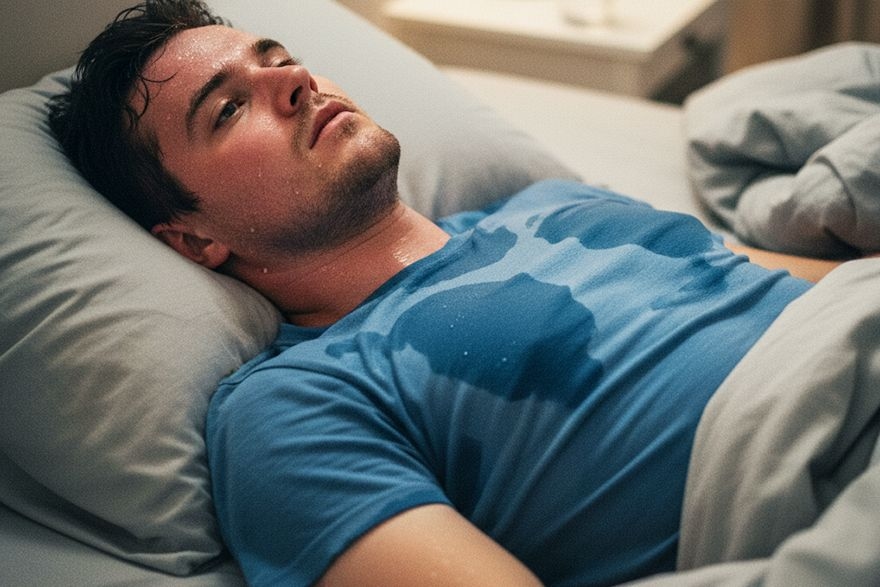Waking up drenched in sweat can disrupt your sleep and lead you to wonder if something is wrong. If you happen to be thinking, “Why am I sweating so much when I’m sleeping?” you are not alone. Research shows that as many as 4 in 10 adults report experiencing night sweats, which can be anything from slight dampness to soaked sheets.
Although a hot room or a pile of heavy blankets can induce sweating, persistent night sweats can indicate hormonal changes, an infection, stress, or a medical condition. Untreated night sweats can negatively affect your sleep and health. This article will examine the symptoms, causes, and treatment of night sweats, and when to see a doctor.
What are Night Sweats?
Night sweats are occurrences of excessive sweating while asleep that can soak your pajamas or bedding. Night sweats are more than just warm from too many heavy blankets, as they are often actively unpleasant and can occur in a cool room.
Night sweats, in the medical sense, are viewed as a symptom rather than a condition. Night sweats can occur due to hormonal changes, an infection, medication, or an underlying condition. In the majority of situations, night sweats are benign due to the external environment, such as a hot room.
If you do not feel hot, yet wake up sweating, this may indicate a more serious condition that requires medical attention again. Night sweats represent more than merely feeling hot; it is excessive and disruptive sweating in your sleep that can affect comfort, the quality of your sleep, and your overall wellness.
Night sweat symptoms include:
- Heavy perspiration in bed, occasionally saturating sheets and clothing.
- Shivering or chilled after episodes of sweating.
- Restless or unrefreshing sleep.
- Feeling hot or flushed at night.
- Feeling tired during the day as a result of poor sleep.
What Causes Night Sweats?
Night sweats can occur due to various factors, including innocuous environmental triggers and more serious underlying conditions. The following are the common triggers related to night sweats:
Sleep Environment – Simple overheating can occur from heavy blankets, non-breathable clothing, or a warm room.
Hormonal Changes – Women going through menopause typically experience hot flashes and night sweats from reduced estrogen levels. The same can happen with a hyperactive thyroid gland or low testosterone levels.
Infection – Infections, such as tuberculosis, HIV, or flu, can have sleeping sweats associated with fever. However, if there are ongoing daytime or nighttime sweats that have no explanation, they should consider an infection that requires a doctor's visit.
Medications – Some medications, such as antidepressants, steroids, and some medications used for diabetes, list sweating as a side effect.
Anxiety and Stress – The experience of emotional stress and an overly active nervous system can lead to sweating during the night.
Serious Conditions – Occasional or chronic night sweats can, in some cases, be seen in cancer (lymphoma) and autoimmune disorders. While less frequent, patients without an explanation for frequent sweating should see their doctor for consideration.

How Does Menopause, Peri menopause, PMS/PMDD Trigger Night Sweats?
Changes in hormones are one of the primary causes of night sweats, especially for women going through menopause, peri menopause, PMS, or PMDD. In menopause, estrogen levels drop dramatically.
Estrogen helps regulate body temperature, and when the levels are lower, it confuses the hypothalamus—the body's control center for temperature—which can generate hot flashes and night sweats. Studies find that almost three-quarters of menopausal women will suffer from this.
In peri menopause, the years leading up to menopause, hormone levels tumble erratically instead of slowly declining. This fluctuation causes night sweats, immediate mood changes, and sleep deprivation, making it hard to rest.
A few women experience night sweats in the course of the menstrual cycle. In PMS, elevated levels of progesterone found in the luteal phase (the time after ovulation and before menstruation occurs) become implicated in regulating body temperature, which causes sweating at night.
Women who experience PMDD, a more serious form of PMS, may experience night sweats coinciding with severe mood disturbances, fatigue, and disturbed sleep, often because of volatile hormone levels. In any event, whether in PMS or PMDD, night sweats serve as a physiological response to hormonal fluctuations.
You can try simple strategies like cooling the bedroom temperature, wearing loose and breathable sleepwear, or avoiding caffeine and/or alcohol. If sweating persists or is severe, please see a healthcare provider.
How does Menopause Treatment Cause Night Sweats?
While night sweats can interfere with sleep during menopause, they can be effectively treated with lifestyle and medical options:
Lifestyle Changes - Simple changes can relieve symptoms:
- Keep the bedroom cool and maintain airflow in the room.
- Wear lightweight, breathable pajamas and use moisture-wicking sheets.
- Avoid alcohol, caffeine, and spicy foods in the evening.
- Practice stress relief techniques like yoga, deep breathing, or meditation.
Hormone Therapy - For moderate to severe symptoms, estrogen therapy (with or without progesterone) will rebalance hormones and eliminate night sweats. Talk to your provider to discuss the benefits and risks related to hormone therapy.
Non-Hormonal Prescriptions - Some antidepressants (SSRIs, SNRIs), blood pressure medications (clonidine), or gabapentin can help with night sweats in women who cannot use hormonal therapy.
Alternative and natural therapies - Some women can alleviate symptoms with phytoestrogens (plant-based estrogens), black cohosh supplements, or by acupuncture (the evidence for these remedies varies).
Healthy Sleep Habits - Some lifestyle habit changes can help. Go to sleep and wake up at the same time every day, avoid heavy meals before bedtime, and don’t use electronics in bed, and you may sleep better despite night sweats.
Natural Remedies for Night Sweats
Numerous individuals prefer natural solutions to lessen night sweats, particularly when the main ingredients are hormonal or lifestyle-related changes. The results differ depending on the person, but these remedies may work when you also maintain good practices.
1. Keep Cool at Night – Using a fan, air conditioner, or breathable bedding can help. Light cotton pajamas or moisture-wicking pajama bottoms can help quite a bit.
2. Herbal Supplements – Black cohosh, red clover, or evening primrose oil may help some women balance their hormones naturally. As always, please reach out to your healthcare provider first before taking any supplementary products.
3. Phytoestrogens-Rich Foods – Foods such as soy, flaxseeds, and legumes are plant-based estrogens that may help lessen night sweats during menopause.
4. Adopt a Healthy Lifestyle – Engage in exercise, drink plenty of water, and avoid spicy foods, alcohol, or caffeine forms before bedtime to help balance body temperature.
5. Stress Reduction – You can also reduce stress-induced night sweats with behaviors like yoga, mindfulness, deep breathing exercises, or journaling that have calming effects on the nervous system.
6. Acupuncture and Mind-Body Therapies - Some studies have shown that acupuncture and activities designed to induce mindfulness or relaxation may reduce the frequency and severity of night sweats.
When to See a Doctor?
Most night sweats are harmless and come from environmental triggers, stress, or hormonal activity. Visit a physician if your night sweats are chronic, severe, or unexplained, especially when accompanied by additional symptoms.
Consider seeking medical advice if the following occurs:
- Sudden, intense sweating that regularly soaks clothing or bedding.
- Fever, unexplained weight loss, or chronic fatigue.
- Swollen lymph nodes or unusual lumps.
- Difficulty breathing, chest pain, or palpitations.
- Night sweats that do not improve with lifestyle changes.
These may be signs of infections, thyroid disease, or possibly certain cancers. The sooner you can be evaluated, the better. Even if your night sweats are depriving you of sleep and affecting your quality of life, it is still a good idea to visit a healthcare provider so that they can help you find solutions and rule out serious health issues.
Final Thoughts
Night sweats are not unusual and can disrupt sleep cycles, typically due to hormonal changes, stress, or environmental factors. However, night sweats that are persistent, severe, or specific may indicate a medical concern.
Increased activity, wearing breathable nightwear, and stress reduction may help with the symptoms of night sweats. In certain circumstances, medical treatments, such as hormone therapy or non-hormonal medications, may aid in improving sleep and overall well-being.













